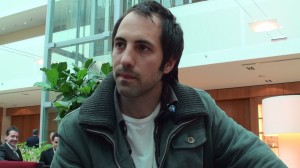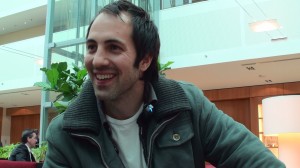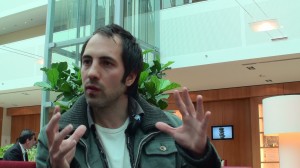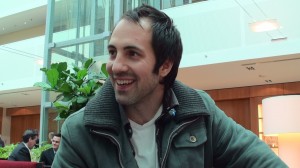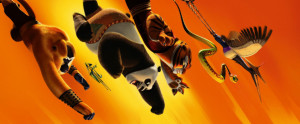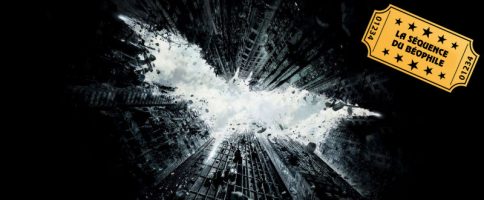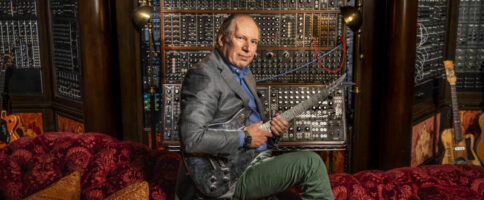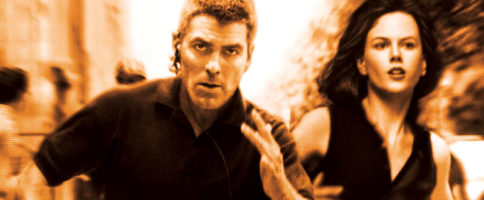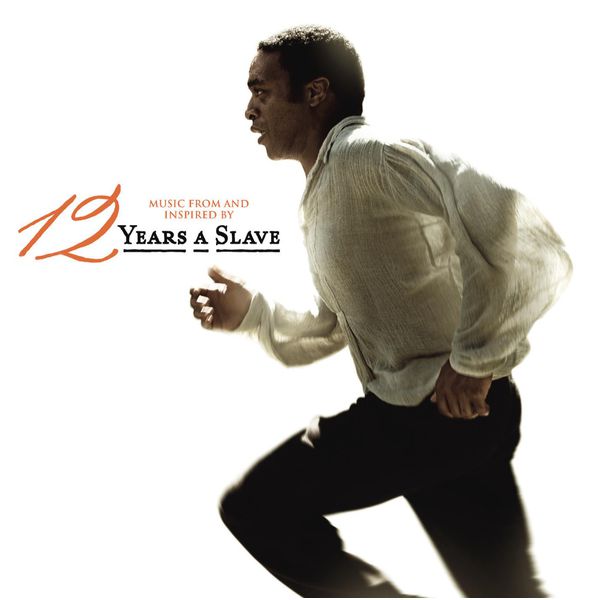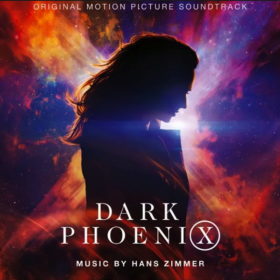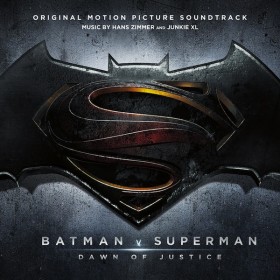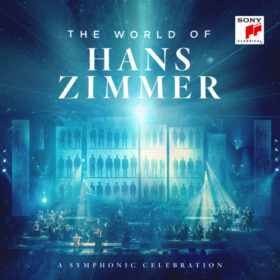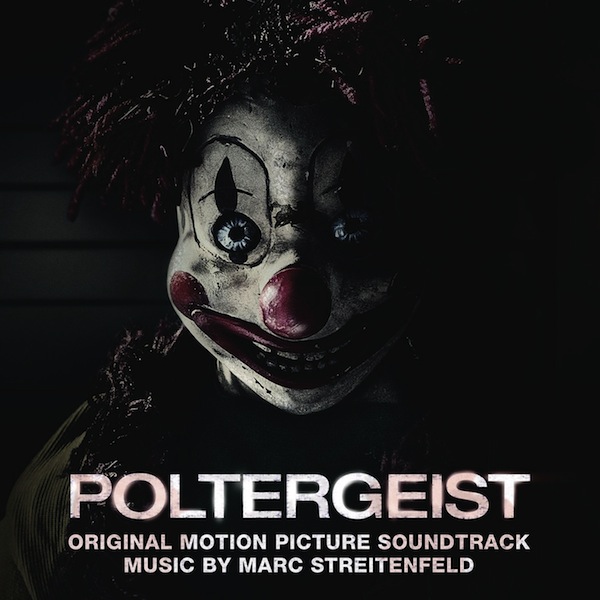Born in Munich, Germany, Marc Streitenfeld relocated to Los Angeles at the age of 19, first working as a musical assistant for Hans Zimmer from 1995 to 1998, then independently as a music editor and music supervisor on several Media Ventures projects, like Mission : Impossible II, The Pledge or The Last Samurai.
He started in 2000 on Gladiator a long collaboration with Ridley Scott, editing music for Hannibal, Black Hawk Down, Matchstick Men and Kingdom Of Heaven before composing the scores for the latest Ridley Scott movies: A Good Year, American Gangster and Body Of Lies. In 2009, he received the « discovery of the year » award at the Ghent Film Festival, in Belgium. He is currently working on Robin Hood, his fourth composition for a Ridley Scott movie.
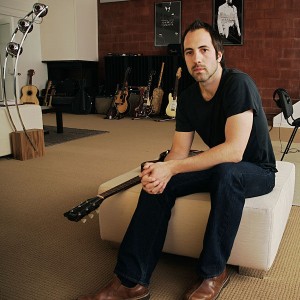 What is your musical background?
What is your musical background?
I grew up on all kinds of different music. As a kid, I played classical guitar. It was my first instrument, my first music style. My dad and I used to listen to popular music, lots of rock. That was my main focus as a teenager, and film music came later in my life, as an interest.
How did you begin to work at Media Ventures?
I worked with Hans Zimmer, not directly with Media Ventures. It was 15 years ago and it was a different operation, much smaller than what you can imagine now. When I started working there, we were travelling a lot in the beginning. We hunted lots of scores to do abroad, in London and so on… We were out of town a lot, so it was very interesting and very educational, a great learning experience and great fun to do it.
You first worked as an assistant for Hans Zimmer?
Yes, I worked for Hans for three and a half years, and then I pretty much had enough from film music. I was just wiped out. I needed a break and I was running away from film music by then. But I recovered and then I found interest again.
You have numerous credits as a technical advisor. What does it mean exactly?
I can’t tell you what it is (laughing). I don’t know myself. It’s a funny name. I was pretty much doing different kinds of things, different kinds of functions, and that’s just one of the credits you get for the work, I was doing different technical works for Hans. I was just learning during that time. I was 19 when I started working for him…
Your work involves a lot of technology, computers…
Now, I don’t use it that much. It depends. Then, it was really new to me because when I started, I didn’t have that much experience with computers or any of that. But it’s definitely part of the job nowadays, a lot of computers involved. As for writing, I really prefer when I can use some instruments to get ideas. But to finish something off, the whole process, it definitely helps to be familiar with technology because it really influences recording techniques and so it really influences the outcome of a composition.
How was it to work as a team at Media Ventures?
The thing is that I never worked as a composer when I was there. I was never involved in the creative process. I was a supporting role for Hans. So I’ve never looked at it from that perspective, because I don’t work that way, I don’t collaborate with that many people. There wasn’t that much collaboration in what was going on. It was really just Hans, myself and an engineer, and that was pretty much it. So it was a much smaller team than the thing it is now.
How important is it to build a relationship with a filmmaker?
There are quite a lot of composers who have a longtime relationship with directors, but it’s not that common nowadays to work exclusively for one director. But it’s really rewarding, especially with a director like Ridley Scott, who makes such an amazing diversity of films. It keeps things interesting and challenging. You also develop an exchange, a dialog, which makes things easier. The communication between the director and the composer is extremely important. We can do a lot of things, but a lot of it has to do with the communication with the director, when he expresses what he envisions for a project and what is right for the movie. That’s a very important part of the process. If you have a similar sensibility, similar taste, not only musically, but on storytelling, if you understand his vision, how comes a character behaves that way, that definitely helps. If you’re comfortable with someone, if you trust someone, you can actually go to more extremes, take more risks.
How did you become the main composer for Ridley Scott?
By scoring A Good Year. That was the first project I did for him. I was taken by complete surprise because I worked with Ridley on many films before. I worked as a music editor and music supervisor for him and he just asked me one day: « Have you ever thought of writing music? » He encouraged me to give it a go for his upcoming film, A Good Year, and that’s how it started. That’s the fourth film I’m doing for him now. To be honest, that was the first score that I ever wrote. I didn’t really write anything before so that’s a funny start, doing the first score right for Ridley Scott.
How did you approach the composition for A Good Year?
I was involved early on in the project. I read the script before and it gave me a basic idea of what the film was going to be. I came to the set, saw some of the dailies. In the cutting-room, I saw some of the footage… Then I came and discussed with Ridley. I gave him my first ideas and it just slowly came together.
And then you moved to your second collaboration with RidleyScott, American Gangster…
I read the script first, had the first ideas from the script. It was shot in New York, lot of it in Harlem, and Ridley was on the set and we spoke over the phone a few times. And again I went to visit the set, and I brought early ideas based on the script. My first thematic ideas and the Frank Lucas theme were pretty much already boiling in my head. I tried to limit myself, in a way, in terms of sounds and technology. The film was set between the years 1969 and 1975, so I didn’t need anything that would be foreign to this time period. I wanted to at least use instruments and technology that were available at that time. But then I wanted to give a fresh approach that was not really just reduced to that seventies feel, because the story and the drama is bigger that just this time period and I wanted to have a more universal approach to whole drama.
Did you feel more confident than for your first score?
I don’t get to scare that easily! (laughing). Every score has challenges. It’s a different challenge each time. First score, second score, third score… they are all going to be a challenge. If you do a hundred, you’ll probably still have a challenge. Every film has its specific things but I think I feel the same confidence. I’m not too worried usually. I’m more excited by doing it.
How much music did you write for American Gangster?
Actually, quite a lot. I think we recorded probably over 100 minutes. The album reduced it really to 40 minutes. I like albums short, especially for that kind of music: lot of it is very energetic, driving music, and there were certain things that weren’t suitable or necessary for that album. So it’s quite a short album. But overall there is quite a lot of music in there, a lot of street noises, traffic going so there is a lot of play between music and sound. So lots of time, it’s very subdued, it has a subdued function.
Do you collaborate with the sound effects team during the mixing process?
I sit right next to the sound mixer to make sure that he doesn’t drink any coffee… (laughing) No, I don’t see it as much as a fight. Whatever is best for the film needs to happen on the dub stage. What I make sure is that the music comes across the same way as it was intended. When you write music to an AVID output or temporary sound effects, you’re up against a different soundscape than on the final mix. Just traffic noises for example, lots of background that frequently changes a lot, so you have to adjust your mix just to preserve the original intention. I think that’s the main goal. Dramatically, where to use music and where it’s more effective and so on, that’s a different story. That’s a point where I really try to do the best for the film. You don’t have to put music in every moment. But I think there’s definitely moments when you try to protect the intention.
What were Ridley Scott’s instructions for Body Of Lies?
It’s not that I get so many direct requests in what he envisions. It’s more an exchange. He gives me some ideas he has about it… You get directions just by the location really, in the Middle East, you can’t ignore that. When the movie is set there, you have to deal with it. And again, there are a few ways of doing this. You can either set the location by local sources, by music that is local to the place. But the story goes from different places in the Middle-East, back to Washington, cuts back and forth. So the location is definitely one factor.
Then, it’s a trickier thing if you incorporate local music to your score, you don’t want to use clichés for that either. You want to be respectful to a culture. I try to give it a feel of it but I didn’t try to claim: « This is Middle Eastern music! » So some of the instrumentation, some of the scales I used indicates that. But I think the music never tries to be an authentic Middle Eastern type. I think that would also wear out after a while. It’s interesting to do it as source music, but if you go back between different countries – just that movie alone is set in 4 or 5 different countries in the Middle East – if you really listen to the music from those countries, there all are different. So it was really to indicate a flavor of the region that was really the intention to have that in the score.
Do you compose sometimes for the final cut of the movie?
The final cut? I’ve never seen one! (laughing) You have to start the collaboration while the film is really in the editing. Those big films, they really come together in the end, there are a lot of things involved: visual effects and so on… I like to start without picture, just write ideas. I don’t have always a picture in front of me when I try to come up with thematics. Sometimes, I’m away from the studio… After that, I think you’ve got to engage with the material, watch it and learn the film. I watch and try to understand it, getting into it. There are different levels in how you can know a film. I think that it’s more important to me than to write for the picture right away. That process happens really more towards its very end when you fine tune everything to picture, when the cut come together, and you execute your compositions right to the picture.
Are you already working on Robin Hood?
Right now, I’m working on the score, but I worked on it quite a bit early on because there were quite a few on-screen musical scenes that needed attention. So I’ve been on it for a few months dealing with that. There were some on screen dances. Fun scenes! Really, fun stuff! So I went over to the set in London and recorded when they were shooting the scenes. And after the shoot, I started focusing on themes and the first ideas were bubbling…
Is it going to be a big orchestral score?
It will definitely be orchestral, but where it is going to go exactly, I’m not sure yet. I’m very excited about it visually: stunning and very inspiring. You’re lucky as a film composer if you have such strong visuals in front of you to inspire you. It makes a big difference so I’m very excited about it.
Do you also compose music for yourself?
Yes and no. I play. It always takes a little time after I finish a film. I stay away from instruments for a few weeks, going out and doing something else. But it definitely always comes out. If you are a musician or a composer, something comes out no matter.
For you, what is the most difficult thing to express musically?
I’ve never thought about this. I think what’s important is that you read a scene right, that you’re sure of what you want to say. Uncertainty can be problematic. If you have a point of view, if you want to say something, and if you know what emotion you’re aiming at, that’s good. If you’re not sure of what you want to say, that can be tricky.
Which stage of your work on a movie do you enjoy the most?
There are many stages that I enjoy. If you come up with things that work, that’s a nice experience. To me it’s always amazing to record with an orchestra. It makes such a difference: the second your music becomes alive, it’s beautiful. I don’t use any samples into the music, you have to create demos and mock-ups, but the second there are real players, I’m excited and I’m happy. That’s a great moment. I’m always amazed what a player can give and contribute to a composition… I also enjoy mixing it, finishing something off is a really nice feeling: « This is it! » Lots of times, you always have the clock ticking, but I enjoy a lot of phases.
What do you think of actual film music compared to 20 or 30 years ago?
It’s definitely quite different. The function has changed a little bit. There’s now so many different types of films, there’s television, there’s videogames… I think the medium has changed a little bit. That also is reflected in the music and what is needed for the music is often different. Lots of times, it has now more of a supporting character, while there was times where it had a stronger function. But still, there are films nowadays where the music is extremely important, but there’re some parts where it has a different role than it used to have then.
Your music is going to be played live tonight. Is it a bit intimidating?
No, I’m very excited. I think it’s a great concept, to have the opportunity to perform your music live. That’s an honor. It’s also a challenge, because it’s such a different setting. You’ve created this music to be recorded, you focus on the work process, prepare for the recording sessions, you choose the soloists… In preparation for the concert, you have to rethink it, re-orchestrate some things. This is completely different, you have to think the music differently.
Interview conducted on october 16, 2009 by Olivier Desbrosses.
Transcription: Nicholas Dubreuil.
Pictures : © Olivier Desbrosses / DR.
Thanks to Thomas Dierckens, Brigitta Portier and the Ghent Film Festival.







